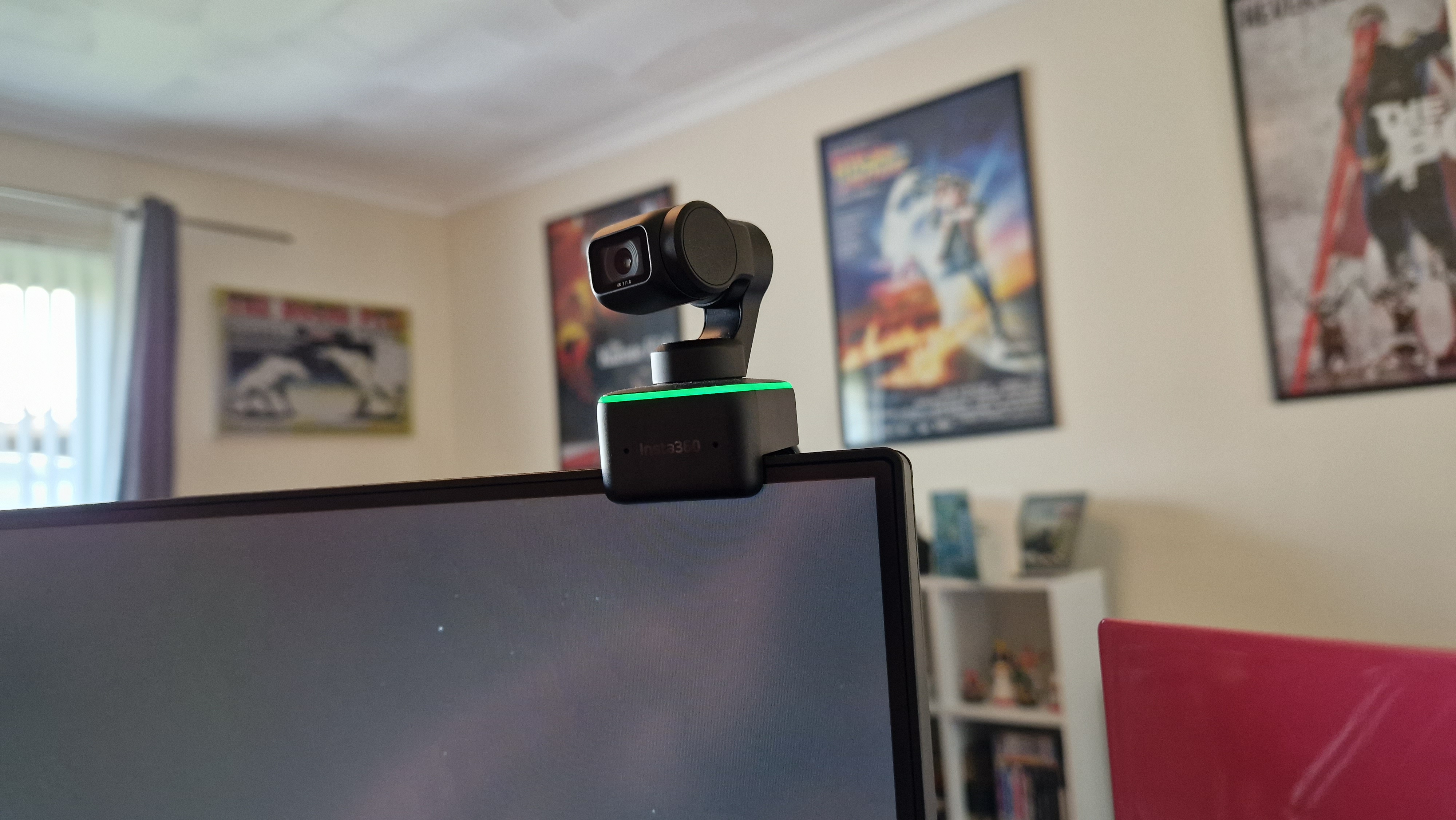GamesRadar+ Verdict
For such a small camera, the Insta360 Link packs a lot of power and a myriad of features inside it. As well as being an adorable little companion for live streaming and video conferencing, it's easily one of the best webcams you can get at the moment. It's just a shame it's so dang pricey.
Pros
- +
Packed with great features
- +
Excellent image quality
- +
Adorable design
- +
Great tracking
Cons
- -
A few software limitations
- -
Pricey
Why you can trust GamesRadar+
The Insta360 Link is the epitome of the Scottish phrase "great gear comes in sma' bulk." Which, hopefully, translates pretty easily to "good things come in small packages." For such a small camera, it packs a lot of power and a myriad of features inside it. As well as being an adorable little companion that genuinely resembles a small digital pet, it's easily one of the top webcams you can get at the moment.
When it comes to shopping around for the best webcams these days, you'll have a pretty clear choice ahead of you; do you want a video conferencing webcam that won't have half of the features you'd want for the money, or do you want a content creation powerhouse like the Razer Kiyo Pro Ultra that has the chops of a DSLR and a price that's probably overkill for most? Although the Insta360 Link presents itself rather modestly as a video conferencing webcam, it has so much versatility that makes it worth a buy for anyone in either camp.
The bad news is that for any 4K webcam, you'll need to pay the toll for it. The Insta360 is admittedly expensive at $299.99 / £318, and its small form factor means it doesn't have the gargantuan sensor of more advanced content creation cams that warrant that price. Regardless, there's a lot to enjoy here.
Design and features
Right away here, you might notice a fairly uncanny resemblance to another small-form webcam, the OSBOT Tiny 4K. The Insta360 Link undoubtedly feels like an answer to it, packing the same 4K punch and AI features that webcam found critical acclaim for in an even smaller body.
Sitting atop a fairly substantial monitor clip (that does have a mounting point for tripod attachments) and a 3-axis gimbal is a small, swiveling camera that, when not in use, faces down. As soon as you start an application that needs to use it though, the rim of the camera base will light up, and the lens will flick up to greet you with an impressive pace. The lens will then take a few brief moments to itself, finding the right amount of tilt while its AI takes over, searching for the exact shape of a human within its frame, and adjusting itself to put you center stage.
Especially after reviewing the Razer Kiyo Pro Ultra, a hulking great ape of a webcam, it is repeatedly astounding to me that a camera this small can capture 4K footage as nicely as the Insta360 does. It might not have the "biggest sensor ever placed in a webcam", but Insta says it does have a half-inch sensor which means it's still capable in lower light conditions. Besides some tiny vent-looking grooves on its back, you wouldn't know it even had the innards to work that hard - it really is that tiny.
| Key Specs | Header Cell - Column 1 |
|---|---|
| Resolution support | 4K (24, 25, 30fps), 1080p (24, 25, 30, 50, 60fps), 720p (24, 25, 30, 50, 60fps) |
| HDR | Yes, at 1080p 20, 25, 30fps and 720p 24, 25, 30fps |
| Exposure compensation | +3 EV |
| Aperture | F1.8 |
| Fixed FOV | DFOV 79.5°, HFOV 67° |
| Connectivity | USB-C to USB-C cable (USB 2.0) or Type-C to Type-A adapter |
| Dimensions | 2.47×1.37×1.77-inches |
I find it really hard not to humanize this webcam's design, in all honesty. As soon as it sparks to life, it resembles a tiny WALL-E, with all the animated expression a single tiny eye can give it. It's so weirdly adorable, and its impressive movement pace exudes a feeling of excitement that's hard to come by from technology these days.
The feature set of the Insta360 Link is what you should really be excited about though, especially seeing as it's a seemingly bottomless well.
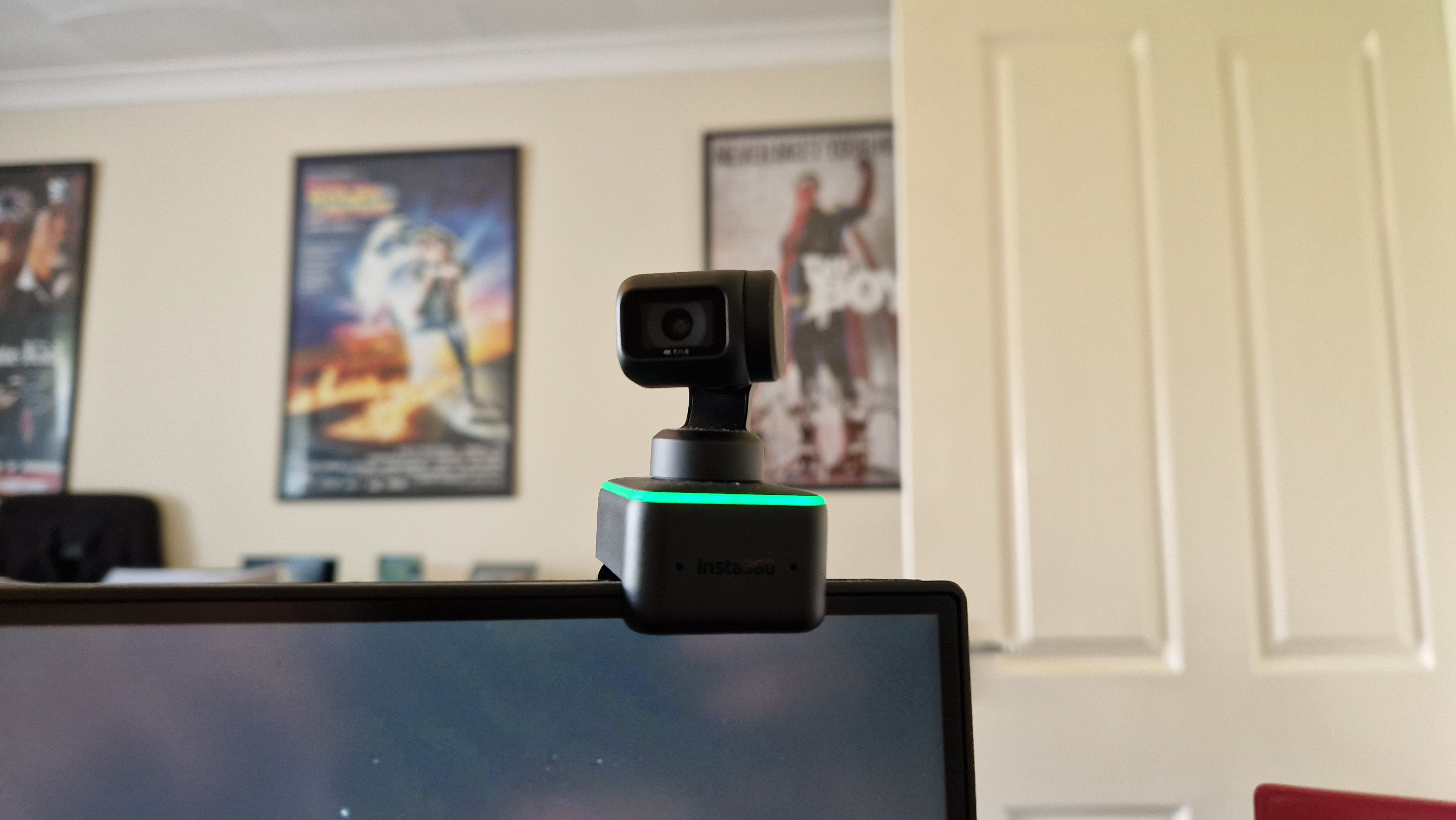
The masthead features, so to speak, are AI facial tracking, 4K resolution, whiteboard mode (for presenting during video calls), and clever gesture controls. That's really just the beginning though. There's really accurate autofocus, a portrait mode if you're trying to record content for Tik-Tok or Instagram reels, and even a super-impressive DeskView mode that pans the lens down just far enough so that it will capture your desktop. As if that wasn't enough, there's also an overhead mode if DeskView doesn't quite capture everything you need. It's a wonder this thing doesn't record gameplay like one of the best capture cards as well.
Gesture controls are really simple, and work great for switching between the main modes. The strip of lights around the camera base helps it to communicate what it's doing too, as, for instance, a blue flash will tell you it's recognized one of your gestures and will start tracking you. In the Insta360 software which is a free download, you can control these things manually, as well as edit the image quality, brightness, recording resolution, and even the level of zoom for facial tracking. This software is really conclusive, and the only thing I feel is missing is more in-depth recording capabilities. It is also a tad disappointing that there's no 1440p resolution support.
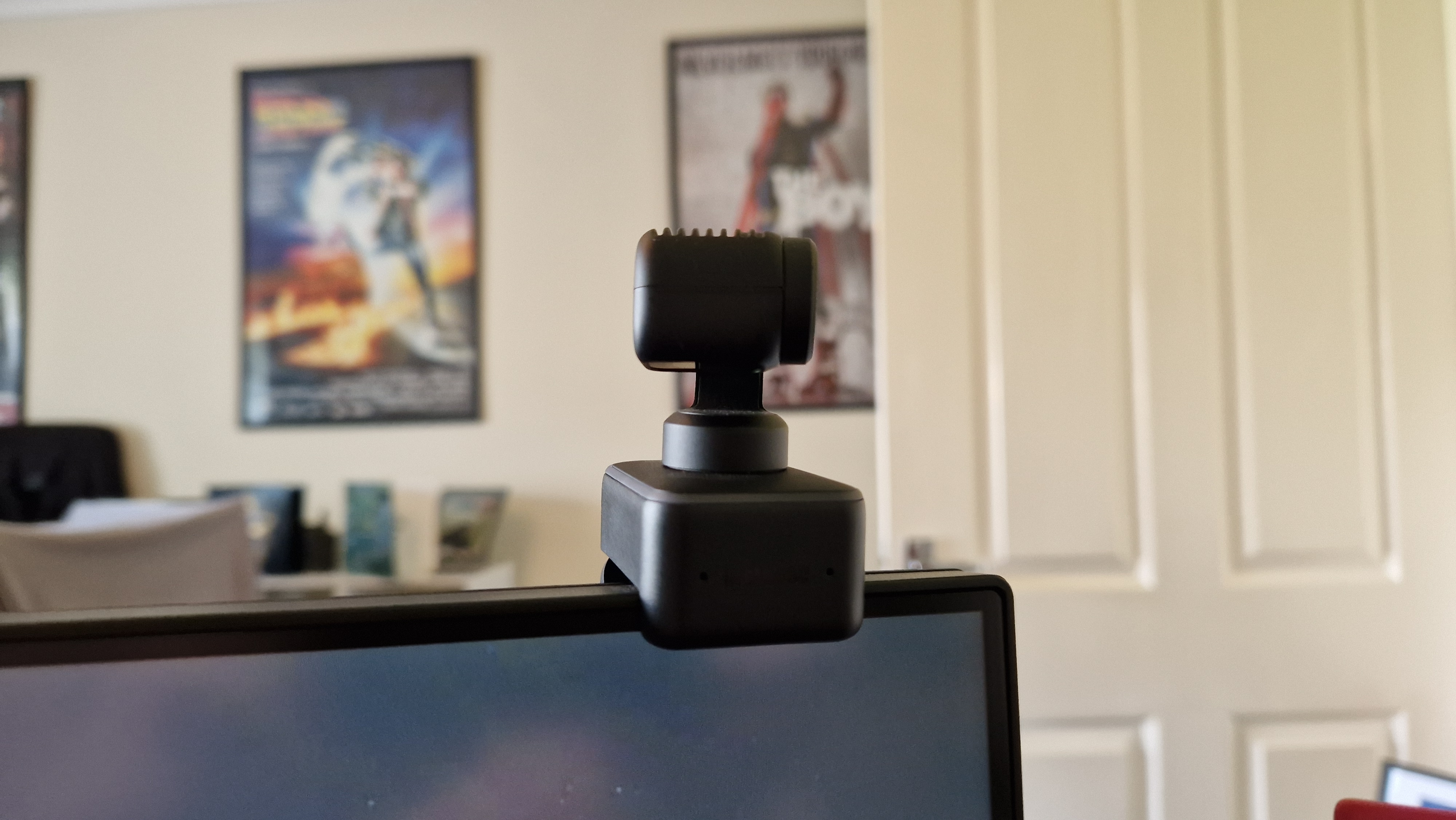
One webcam feature I think always deserves some credit is built-in privacy protection. The Insta360 will automatically pan the lens all the way down after 10 seconds of no application using it, resembling a puppet that's had its strings dropped. I really liked this, and it was always satisfying to watch how quickly the camera lens could flick up, down, and around.
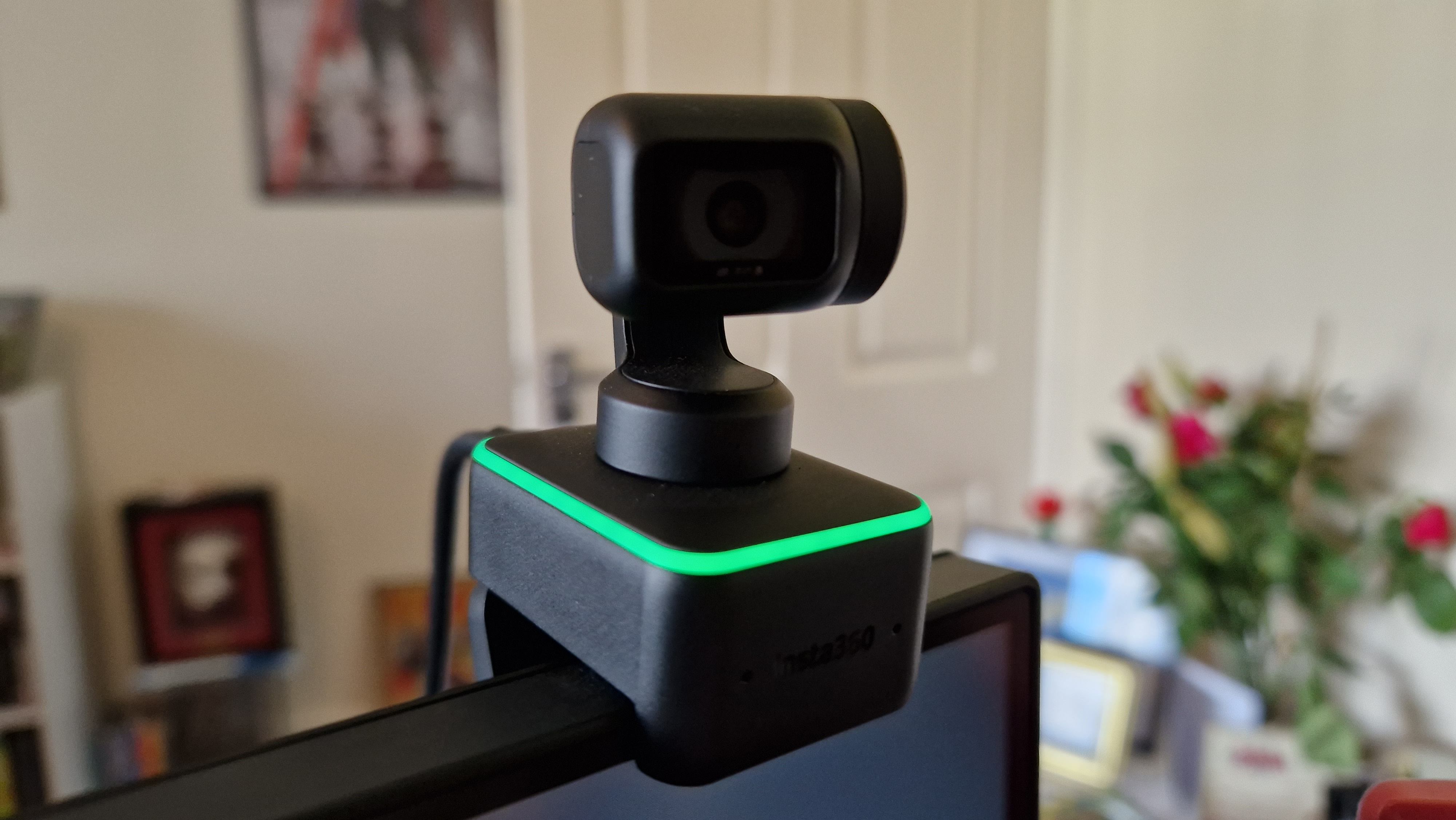
Performance
I have to say, of all the webcams with AI facial tracking I've seen, the Insta360 Link is the best, and most natural. So much of the time, this feature in webcams is really distracting, and often obtrusive. If it isn't tracking the subject's every slight movement, it's probably accompanied by a hilarious zoom that, every time I see, makes me feel like I've been pulled into one of Oblivion's NPC interactions.
Insta360, on the other hand, doesn't have a zoom feature unless you control it to do so. Further, it doesn't adjust to every single movement you make, and it moves really smoothly thanks to its 3-axis gimbal. As long as you're in the middle third of the shot, it seems to be pretty happy - and that's exactly how this feature should work.
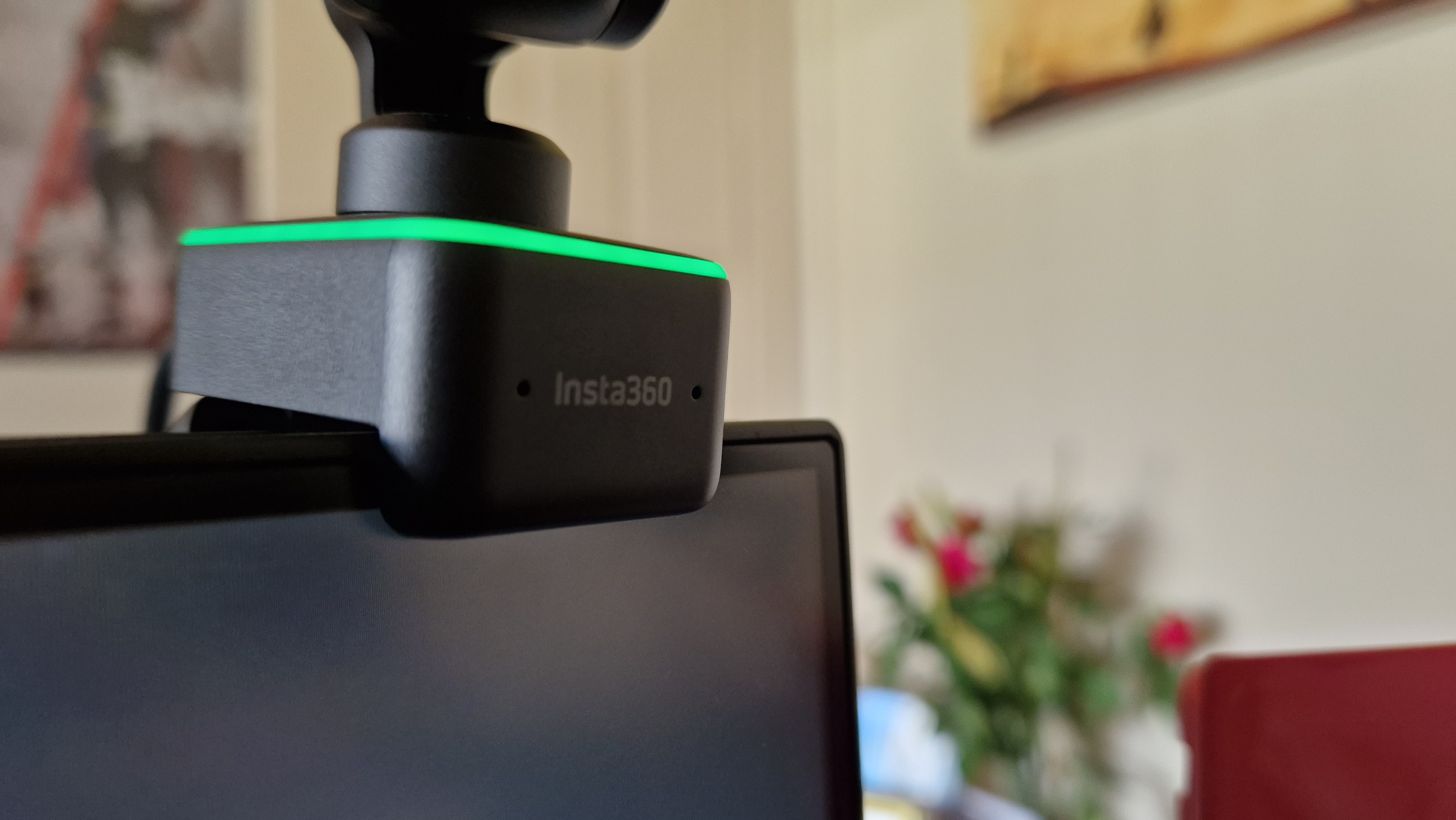
I absolutely adored this when I used the Insta360 Link as my Twitch stream's face cam. I often have dreadful posture when I stream because I'm always trying to find the right viewing angle for the display while trying to stay in the perfect place for the shot. Having some gentle tracking from the Insta360 meant I could shuffle position, get comfy, and have a great view of my monitor without any worry that I wasn't in the frame. This is something I absolutely won't go back on from now on, even for a camera that has better picture quality.
In more general uses for work meetings, the Insta360 worked great as well. It handled bright room conditions just as well as darker ones, and I liked that I could adjust the brightness, contrast, and saturation too. In total honesty, I didn't test out the whiteboard mode that allows for enhanced zooming when presenting on camera. This is just not something I could personally find a use for. But after using all the various tracking, zooming, and DeskView modes, I'd be willing to bet that this is something that will most likely work great if needed it.
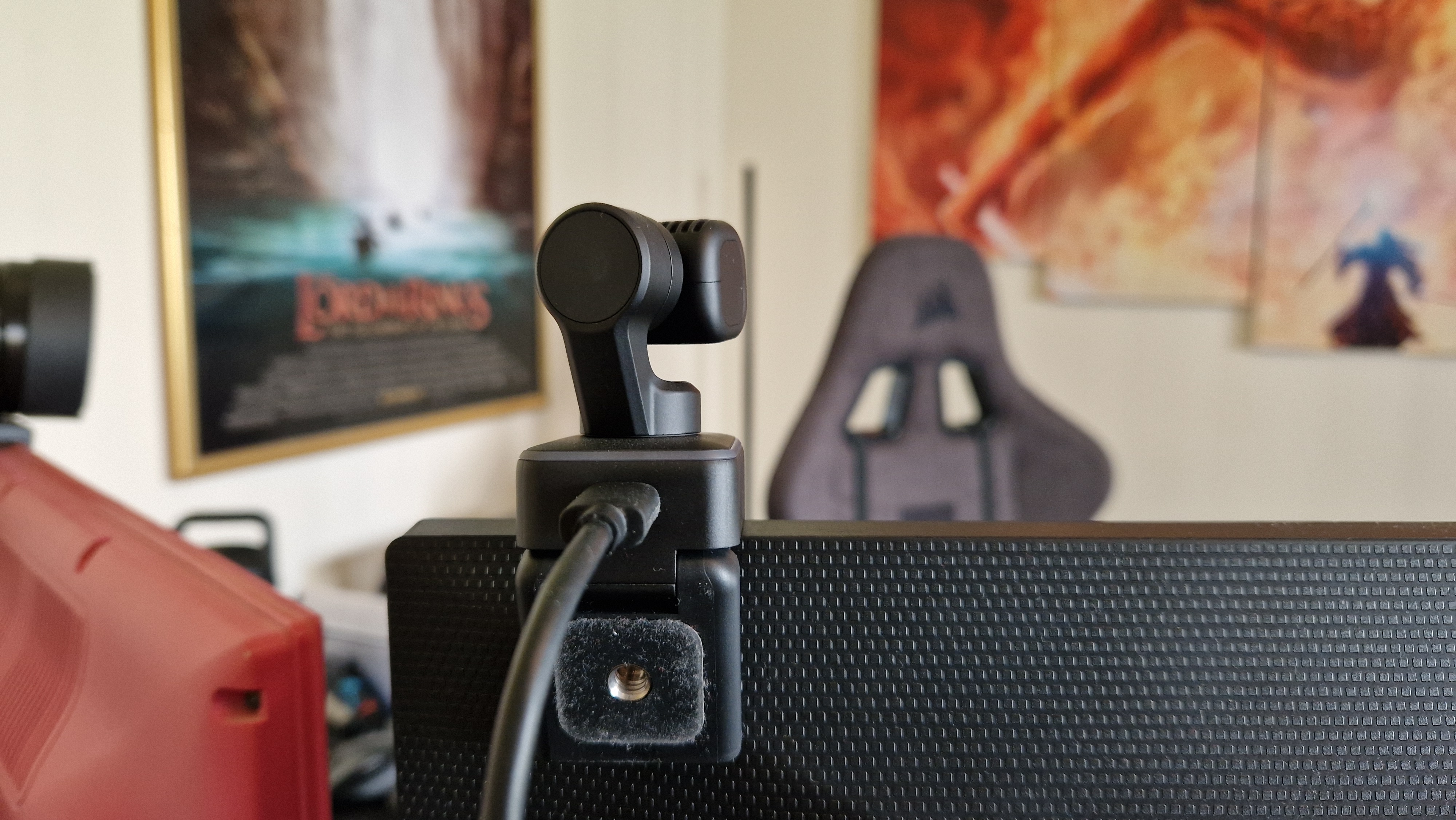
DeskView mode, in particular, is a standout feature for streamers and content creators. As well as highlighting how dusty my desk and keyboard are, it's such a nifty thing to be able to pan down to watch mouse and keyboard action during gameplay, or to highlight a certain bit of equipment. I frequently see this as a Twitch channel points reward for a lot of streamers, and the Insta360 negates any need to buy a separate camera for doing it.
In terms of recording and keeping to frame rates, this webcam did a splendid job, never once falling out of sync with the Game Capture HD60 S, or the Blue Yeti Nano. One thing I struggled with, however, despite Insta saying on its website that the 360 Link can record in both H.264 and MJPEG formats, was that whenever I tried to record a video in the companion software, it would save as an AVI file. I can't find any way to change this, and it's a real shame there aren't more in-depth recording preferences built in, especially for different frame rates.
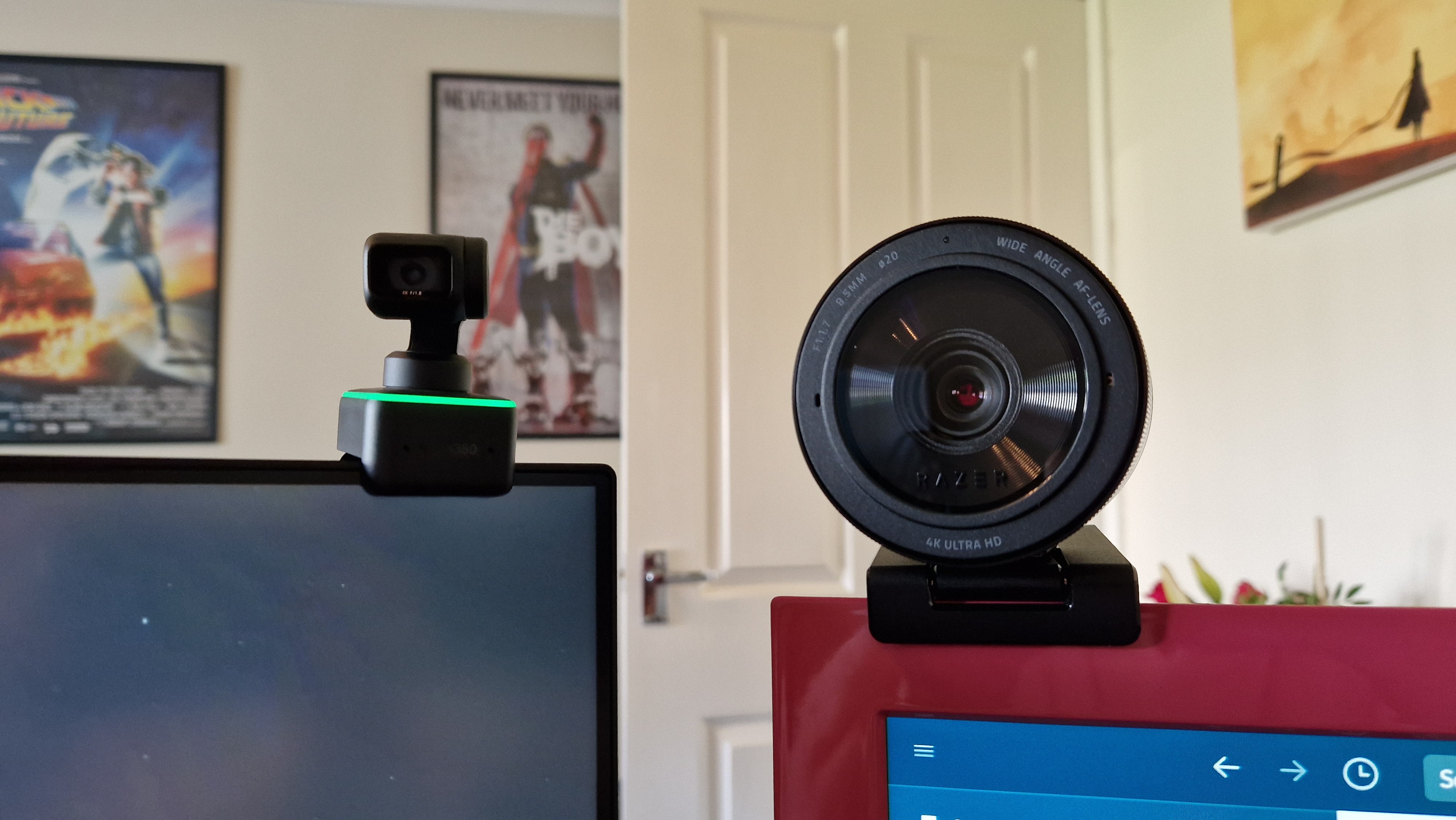
Should you buy the Insta360 Link?
It'd be easy to look at the litany of features the Insta360 Link has and think a lot of them must be fluff. This absolutely isn't the case, however, and it results in a 4K webcam that's as versatile as it is adorable. Besides the Whiteboard mode, which I'm sure would be useful for plenty of remote-working professionals, I found practical uses for all of the Insta360's features in a streaming and content creation scenario.
This is a feature-packed 4K webcam that's so easy to recommend. It's a shame, then, the price throws a spanner in the works. The Razer Kiyo Pro Ultra is probably the best webcam ever made, and in terms of low-light performance and pure image quality, that's a better camera. It's also priced around the $300 / £300 mark - but very much justifies that kind of price because it's actually competing with DSLR cameras that cost monumentally more. The Insta360 Link has a much higher number of practical features than the Kiyo Pro Ultra, and certainly puts its form factor to shame. But in terms of pure image quality, Razer's option does have it beat.
It really depends on what you want to spend your money on in a webcam. If you want sheer image quality, go for the Kiyo Pro Ultra. If you still want excellent camera quality but would rather have the slew of practical features, the Insta360 Link is what to go for. Ultimately, if you can afford either of them - that is to say, if you can justify paying £300 or more for a webcam - both options will serve you well.
How we tested the Insta360 Link
I used the Insta360 Link as my work and content creation webcam for around a month before this review. I compared it closely to the Razer Kiyo Pro Ultra which I reviewed most recently, and because the two are similarly priced. I tested the various features the Insta360 has by using gestures, and by getting familiar with the bespoke companion software for it.
I used it for streaming on Twitch, integrating it into my setup with the Elgato Game Capture HD60 S and Blue Yeti Nano. I recorded longer videos with this gear and checked the sync of the footage to see if the Insta360 Link's framerates were consistent. They were.
If you want to read more about how we test the latest gaming and streaming tech at GamesRadar, have a relaxing read of our hardware policy while sipping on a beverage of your choice.
Gearing up for your Twitch career? Have a look at the best ring lights for streaming, the best green screens, and the best microphones for streaming and gaming.
One of my earliest memories is playing SuperMario64 and wondering why the controller I held had three grips, but I only had two hands. Ever since I've been in love with video games and their technology. After graduating from Edinburgh Napier University with a degree in Journalism, I contributed to the Scottish Games Network and completed an Editorial Internship at Expert Reviews. Over the last decade, I’ve been managing my own YouTube channel about my love of games too. These days, I'm one of the resident hardware nerds at GamesRadar+, and I take the lead on our coverage of gaming PCs, VR, controllers, gaming chairs, and content creation gear. Now, I better stop myself here before I get talking about my favourite games like HUNT: Showdown, Dishonored, and Towerfall Ascension. Location: UK Remote
